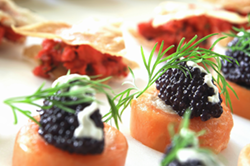Food Sampling and Give-Away Events
Food Safety Requirements for Food Sampling and Give-Away Events
Permission to engage in future events may be contingent upon compliance with the requirements below.
Transportation
- Provide a digital stem-type thermometer to test food for proper temperatures.
- Cover or wrap food in a sanitary manner for transportation. Food items considered potentially hazardous (perishable) must be kept refrigerated below 41°F or held hot above 140°F during transportation. Potentially hazardous foods include, but are not limited to, such foods as meat, fish, seafood, poultry, dairy products, eggs, and pasta.
- Maintain required temperatures and protect food from contamination during transportation to the booth.
Storage
All food products and utensils (plates, cups, spoons, knives, and forks) must be stored 6-inches off the ground. Pallets, tables, and empty boxes may serve as storage racks.
Preparation and Handling
- Prior to service, no public direct hand contact of food is allowed.
- All food, beverages, equipment, and utensils shall be protected at all times from unnecessary handling and shall be stored, displayed, and served so as to be protected from contamination.
- Food and food packaging materials (i.e., cups, lids, etc.) must be stored off of the ground.
- Unprotected food should have a minimum distance of 6-feet from the public.
- Foods are to be served in or with single-service utensils.
Condiments
- Condiment containers, if accessible to the public, shall be the pump-type or have self-closing or hinged covers for protection. Single service packets are recommended.
- No open bowls or jars of condiments are allowed.
Utensils
- Single-service cups, bowls, plates, etc., must be served from the original container (e.g., plastic bag) or from an approved dispenser.
- You must provide adequate utensils, such as spatulas, tongs, forks, ice scoops, etc., for handling foods.
- Single-service knives, forks, and spoons are to be dispensed properly from original containers or individually wrapped, or otherwise adequately protected.
Physical Facilities
- Overhead protection is required over all food operations conducted outdoors. Examples include a tent, awning, or fly.
- Unless food is only touched with tongs, paper wrappers, forks, or spoons, a temporary hand-sink setup will be required.
Personal Hygiene
Food handlers must:
- Be in good health and shall not have been ill with vomiting or diarrhea within 72 hours of the event.
- Wash their hands after visiting the restroom and prior to the start of food preparation.
- Wear clean outer garments.
- Wear effective hair restraints (hats/caps) to control long hair.
- Apply sanitary food handling techniques at all times. Whenever practical, food handlers shall use tongs, paper wrappers, or single-use gloves.
- Refrain from eating food while working. Cups with straws or sports bottles are permissible for drinking.
